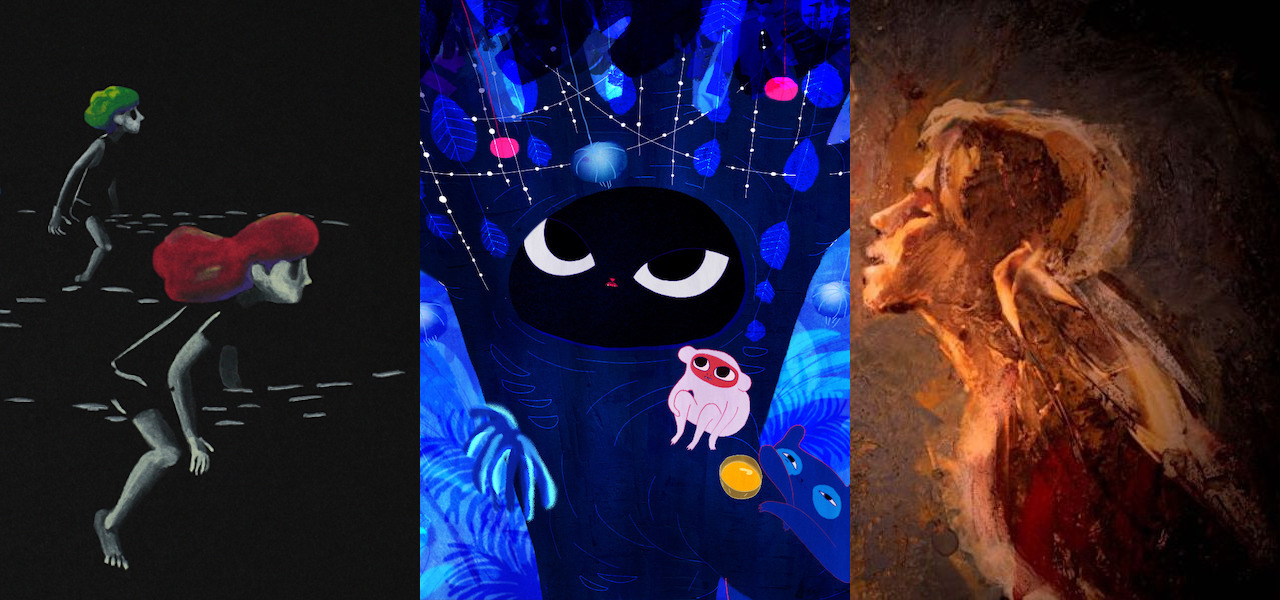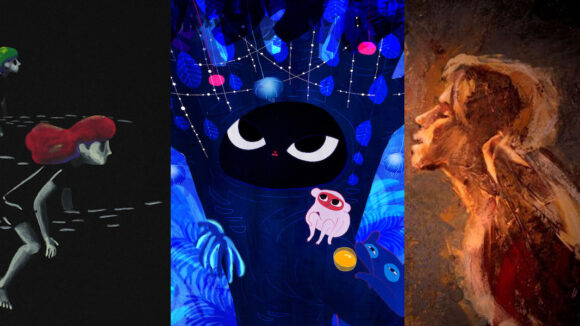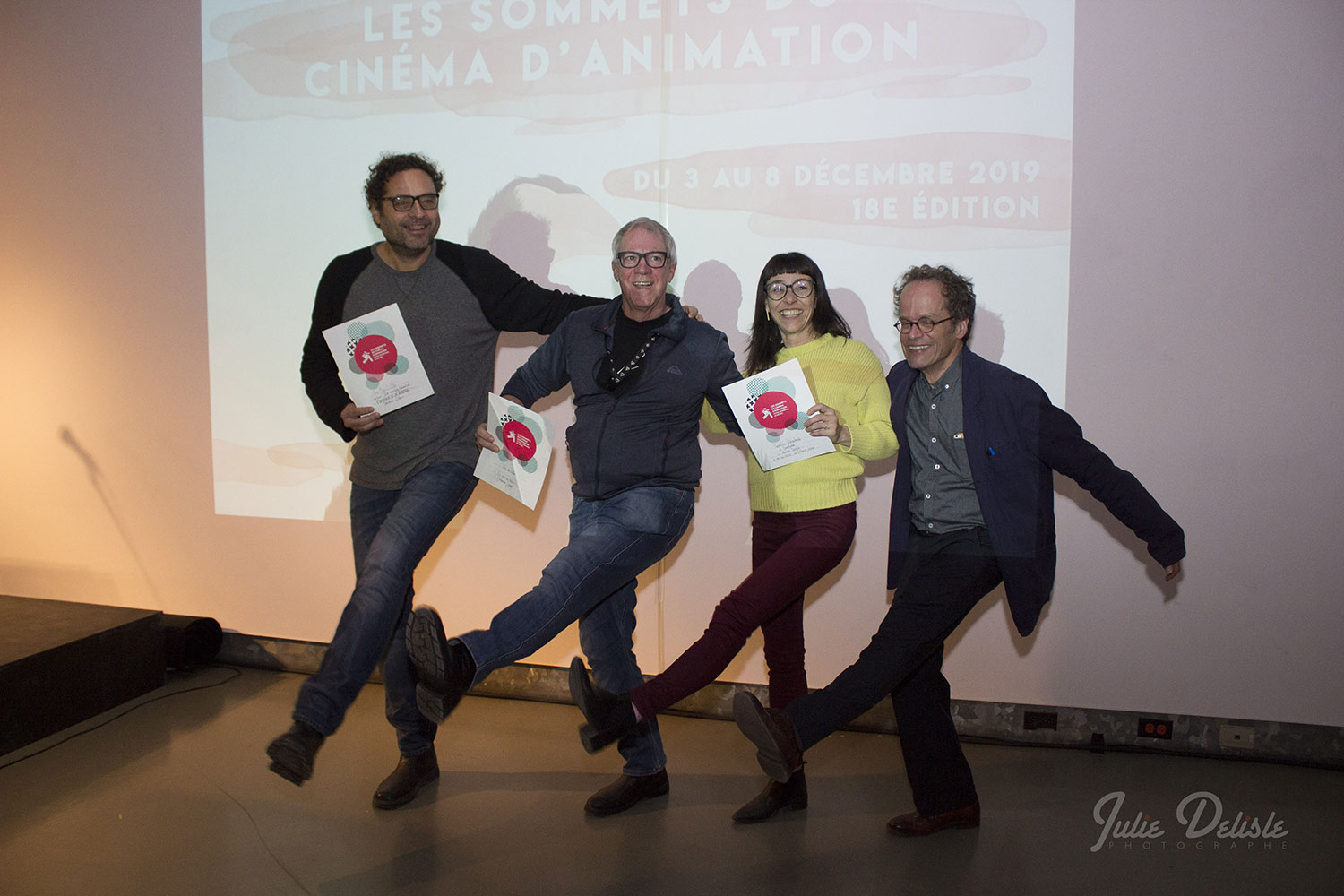

‘And Then The Bear,’ ‘Sweet Night,’ ‘The Physics Of Sorrow’ Top Sommets 2019
Les Sommets du cinéma d’animation, Montreal’s spirited festival, has wrapped up its 18th edition (December 3–8). The award winners, which are all shorts (there is no feature competition), reflect the eclecticism of the programming.
The grand prize went to And then the Bear by Agnès Patron. In boldly stylized images, Patron tells an enigmatic tale of a boy’s nighttime encounter with animals. The film has had a high-profile festival run, premiering in competition at Cannes and going on to play at Toronto; it has picked up close to a dozen awards already. The jury praised the film’s “great mastery of its techniques in dealing with a complex subject in a pared-back style.”
Sweet Night (Nuit chérie) by Lia Bertels took the jury prize. The meditative fable spins an allegory about insomnia through its story of a bear (again!) who can’t hibernate and his wide-eyed monkey friend. According to the jury, the film “presents a deeply original world populated by unexpected and endearing characters, who share, over the course of a night, their humanity and sensitive experience of the world.”
Theodore Ushev’s The Physics of Sorrow was named best Canadian film. The semi-autobiographical 26-minute work by the veteran Bulgarian filmmaker has drawn attention for its pioneering use of encaustic painting in animation. The film won the equivalent prize at Ottawa International Animation Festival in September. The Sommets jury recognized its “narrative and graphic power which keeps the audience on tenterhooks, the originality of its technique, the achievement of its soundtrack, and the artistic accomplishment it represents.”
An honorable mention in this category went to Catherine Lepage’s Le mal du siècle, which had its world premiere at the festival, and also took the audience award. The first-time director based the film on her graphic novels, which explore her experiences of depression. Like The Physics of Sorrow, it is produced by the National Film Board of Canada — indeed, the two films share a producer, Marc Bertrand. This double recognition gives a sense of how much the NFB dominates independent animation in Canada.

Another noteworthy category was the festival’s inaugural pitching contest, which Cartoon Brew co-sponsored. Five emerging filmmakers had ten minutes each to pitch an idea for a short film; the jury (on which I sat) rewarded Max Vannienschoot for his project O, an allusive homage to a friend who committed suicide. We were struck by “the coherence of the project, the clarity with which Vannienschoot described the film’s metaphors and visual universe, his authenticity, and his sincerity.”
Here is the complete list of winners from the 2019 edition:
Grand Prize Sommets/École NAD-UQAC for the International Competition
And then the Bear (L’heure de l’ours) by Agnès Patron, France
Special Jury Award
Sweet Night (Nuit chérie) by Lia Bertels, Belgium
Guy-L. Coté Prize For Best Canadian Film
Winner: The Physics of Sorrow (Physique de la tristesse) by Theodore Ushev
Honorable mention: Le mal du siècle by Catherine Lepage
People’s Choice Award
Le mal du siècle by Catherine Lepage, Canada
UQAT Award for Best Very Short Film
Wind by Dana Sink, U.S.
International Student Competition Award
Winner: Bacchus by Rikke Alma Krogshave Planeta, The Animation Workshop, Denmark
Honorable mention: La Ballade de l’autre elle by Ambre Gaultier, EMCA, France
Award École NAD-UQAC for Best Canadian Student Film
I Want a Sun in My Pocket by Laui Laessa, Vancouver Film School
Pitching Contest Prize
Winner: O by Max Vannienschoot
Honorable mention: Les fines disparitions by Maud Christiane
Mini-Sommets Award
The Kite by Martin Smatana, Czech Republic/Slovakia
This year’s edition of Sommets received 850 entries. A total of 138 films were selected for comeptition, with 33 of th
The international/Canadian competition jury was comprised of Rupert Bottenberg, Eva Cvijanovic, Dahee Jeong, Xavier Kawa-Topor, and Charles-André Vincelette. The student jury consisted of Étienne Déniger, Mélissa Rousseau, and Anne Xiulan Côté. The pitching contest jury consisted of Alex Dudok de Wit, Janice Nadeau, and Jean-Christophe Lamontagne.

.png)